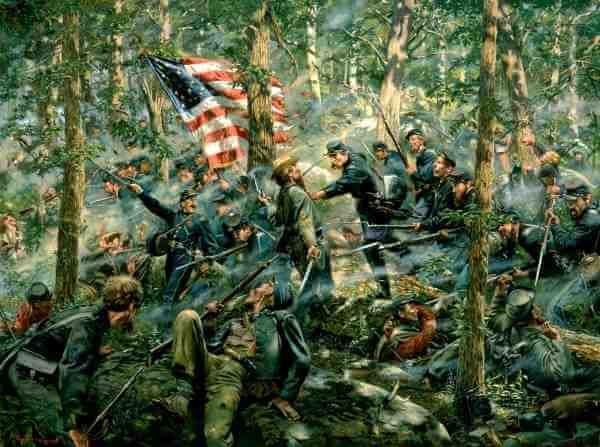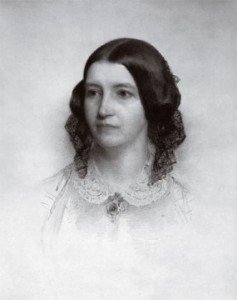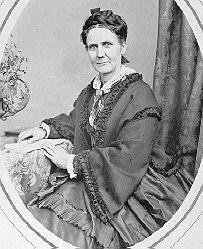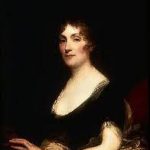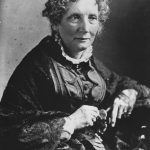Wife of Brigadier General Joshua Chamberlain
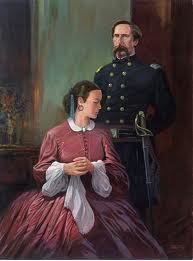 Frances Caroline Adams was born on August 12, 1825, in a suburb of Boston, Massachusetts. Her parents were rather old at the time of her birth. Fanny, as she was called, was passed around to different family members, finally living with her cousin Reverend George Adams in Brunswick, Maine. Adams was the pastor of the First Parish Congregationalist Church, and he often ministered to the students of nearby Bowdoin College, where he was a member ofthe Board of Overseers.
Frances Caroline Adams was born on August 12, 1825, in a suburb of Boston, Massachusetts. Her parents were rather old at the time of her birth. Fanny, as she was called, was passed around to different family members, finally living with her cousin Reverend George Adams in Brunswick, Maine. Adams was the pastor of the First Parish Congregationalist Church, and he often ministered to the students of nearby Bowdoin College, where he was a member ofthe Board of Overseers.
Image: Joshua and Fanny
Dale Gallon, Artist
Fanny grew up in this strictly religious home,and received a good education. She was an intelligent and artistic girl with a talent for music and singing. She made occasional visits to her family in Boston.
Joshua Lawrence Chamberlain was born in Brewer, Maine, on September 8, 1828, the oldest of five children. He entered Bowdoin College in Brunswick, Maine, in 1848, after teaching himself to read Ancient Greek in order to pass the entrance exam.
While at Bowdoin, he met many people who would influence his life, including Harriet Beecher Stowe, the wife of a Bowdoin professor. Chamberlain would often go to listen to her read passages from what would later become her celebrated novel, Uncle Tom’s Cabin.
Joshua and Fanny met at church. She often played the organ for the church choir, which he sometimes led. He was immediately attracted her. She was three years his senior, but the difference in their ages did not seem to matter to them. Reverend Adams thought Joshua was not good enough for his adopted daughter, but they later shared a mutual respect.
During Joshua’s junior and senior years at Bowdoin, the romance flourished, but even after Joshua graduated Phi Beta Kappa from Bowdoin, marriage was out of the question – there was no money and he wanted to study at the seminary.
Early in 1852, Fanny went to New York to study music. They were engaged before she left, but did not see each other for the next two and a half years. Joshua worked toward a Master’s Degree at the Bangor Theological Seminary, while Fanny taught voice at a girls’ school, gave private piano lessons, and played the organ at a Presbyterian church in Milledgeville, Georgia.
Fanny returned to Maine in the summer of 1855 in time to see her fiance graduate from the Seminary. Fanny Adams married Joshua Chamberlain in her father’s church on December 7, 1855. The newlyweds lived in rented rooms, while Joshua taught Logic and Natural Theology and was given charge of Freshman Greek.
The Chamberlains would have five children, two of whom survived to adulthood. In October 1856, Fanny give birth to a daughter they named Grace Dupee, whom they nicknamed Daisy. In November 1857, Fanny went into labor three months early with their first son, but their premature infant only survived a few hours. A second son was born a year later, and after a few moments of anxiety, it was thought the boy would grow strong and they named him Harold Wyllys. Two more daughters followed – Emily Stelle in 1860 and Gertrude Lorraine in 1865 – but neither child survived to see their first birthdays.
The Civil War
In 1861, Joshua was appointed Professor of Modern Languages. He was fluent in nine languages other than English: Greek, Latin, Spanish, German, French, Italian, Arabic, Hebrew, and Syriac. He taught at Bowdoin College until the Civil War began.
Despite the college’s protests, he took a leave of absence and enlisted as lieutenant colonel in the 20th Maine Voluntary Infantry Regiment in the V Corps, Army of the Potomac.
Fanny remained at home raising their two small children, while Joshua rose through the ranks. There is speculation that she resented the Army for disrupting her life, and her great fears of abandonment once again rose to the surface.
In December 1862, the 20th Maine fought at Fredericksburg, where they suffered relatively small numbers of casualties in the assaults on Marye’s Heights, but were forced to spend a miserable night on the freezing battlefield among the many wounded from other regiments. Chamberlain wrote about that night in his diary, describing in great length how they used the bodies of the fallen for shelter and a pillow while listening to the bullets zip into the corpses.
Chamberlain was promoted to colonel of the regiment in June 1863, upon the promotion of his commander, Adelbert Ames. One of Chamberlain’s younger brothers, Thomas Chamberlain, was also an officer of the 20th Maine.
In the early summer of 1863, Fanny traveled to Washington, DC, where she tried to obtain a pass to visit Joshua in the field. The pass was denied because the 20th Maine was experiencing a smallpox outbreak. She had reached New York City on her way back home when news came of the Battle of Gettysburg. Fanny chose to remain in the city and wait for news of the outcome.
In the meantime, Fanny was caught up in the New York City Draft Riots. She remained sequestered at the St. Germaine Hotel on Fifth Avenue and Broadway, while the army rolled cannons into the park across the street. When the danger passed, she returned home to Maine.
Chamberlain at Gettysburg
Colonel Joshua Chamberlain achieved fame at Gettysburg, where his valiant defense of a hill named Little Round Top became the focus of many publications and stories, including the novel The Killer Angels and the film Gettysburg.
In the summer of 1863, Chamberlain marched the 20th Maine northward in pursuit of General Lee. On July 1, the V Corps marched to Hanover, Pennsylvania, before turning west toward Gettysburg. An overnight forced march got the troops to a location in the rear of Cemetery Ridge; the next day and Chamberlain’s men took a brief but grateful rest.
On the second day of fighting at Gettysburg, Union forces were recovering from initial defeats and hastily regrouping into defensive positions on a line of hills south of the town. That afternoon Lt. General George Meade sent his chief of engineers, Brigadier General Gouverneur K. Warren, to assess the situation. Warren found Little Round Top completely undefended.
The V Corps was called to the front when fighting began at 4 o’clock. Colonel Strong Vincent, who commanded the 3rd Brigade of Brigadier General Charles Griffin’s First Division of the V Corps, received word from a courier about the threat to Little Round Top and led his men to the hill at the double-quick. Vincent’s brigade included the 44th New York, 16th Michigan, 83rd Pennsylvania and the 358-man 20th Maine under Colonel Joshua Chamberlain.
Sensing the momentary vulnerability of the Union forces, the Confederates began an attack against the Union left flank. With the remainder of Colonel Vincent’s brigade, Chamberlain’s men rushed to the front to be placed on the southern slope of Little Round Top. Later in life, Chamberlain wrote that his regiment was the first in line, but it actually took up its position last, curving its line back around to the east and forming the Union Army’s extreme left flank.
Within minutes they were trading volleys with Confederate skirmishers tramping down the slope of Big Round Top, soldiers from General Evander Law’s Alabama Brigade, who had climbed over the summit of the larger hill, reorganized, and were now sweeping northward toward the Union line.
The regiments collided on the hillside and Chamberlain’s regiment stood firm. It was a tumultuous scene of savagery as smoke, fire, and the groans of dying men filled the woods. Standing behind his thinning ranks, the colonel could see the effect of the Confederate charges on his position:
The roar of all this tumult reached us on the left and heightened the intensity of our resolve. Meanwhile the flanking column worked around to our left and joined those before us in a fierce assault, which lasted with increasing fury for an intense hour. The two lines met and broke and intermingled in the shock. The crush of musketry gave way to cuts and thrusts, grapplings and wrestlings. The edge of conflict swayed to and fro, with wild pools and eddies.
At times I saw around me more of the enemy than of my own men; gaps opening, swallowing, closing again with sharp, convulsive energy; squads of stalwart men who had cut their way through us, disappearing as if translated all around me, strange, mingled roar- shouts of defiance, rally and desperation; and underneath, murmered (sic) entreaty and stifled moans; gasping prayers, snatches of Sabbath song, whispers of loved names; everywhere men torn and broken, staggering, creeping, quivering on the earth, and dead faces with strangley (sic) fixed eyes staring stark into the sky.
The relentless Confederate assaults shredded Chamberlain’s ranks and the situation looked grim as ammunition began to run out. Sensing exhaustion among the Confederates who were also probably running out of ammunition, he formulated a final plan to defend the 20th Maine’s part of the shrinking Union line. There was a brief lull in the fighting when the colonel called all of his officers quickly to a meeting and explained his proposal – the 20th Maine was going to make a charge.
Not a moment was about to be lost! Five minutes more of such a defensive and the last roll call would sound for us! Desperate as the chances were, there was nothing for it but to take the offensive. I stepped to the colors. The men turned towards me. One word was enough- ‘BAYONETS!’ It caught like fire and swept along the ranks. The men took it up with a shout, one could not say whether from the pit or the song of the morning sat, it was vain to order “Forward!”
The whole line quivered from the start; the edge of the left-wing rippled, swung, tossed among the rocks, straightened, changed curve from scimitar to sickle-shape… It was a great right wheel. Our left swung first, the advancing foe stopped, tried to make a stand amidst the trees and boulders, but the frenzied bayonets pressing through every space forced a constant settling to the rear.
Ranks were broken; some retired before us somewhat hastily; some threw their muskets to the the ground- even loaded; sunk on their knees, threw up their hands calling out, “We surrender. Don’t kill us!” As if we wanted to do that! We kill only to resist killing. And these were manly men, whom we could befriend and by no means kill, if they came our way in peace and good will.
The 20th Maine rushed down the hill, with the left wing wheeling continually to make the charging line swing like a hinge, thus creating a simultaneous frontal assault and flanking maneuver, capturing many of the Confederate soldiers and successfully saving the flank. This charge was the climax of the fighting in front of Vincent’s brigade and contributed greatly to the Union victory at Little Round Top.
Chamberlain sustained two slight wounds in the battle, one when a shot hit his sword scabbard and bruised his thigh, and another when his foot was hit by a spent bullet or piece of shrapnel. For his tenacity at defending Little Round Top he was known by the sobriquet Lion of the Round Top.
Late in 1863, Chamberlain developed malaria and was taken off of active duty until he recovered.
Chamberlain at Petersburg
In April 1864, Chamberlain returned to the Army of the Potomac shortly before the Siege of Petersburg. There, in a major action on June 18, at Rives’ Salient, Chamberlain was shot through the right hip and groin. Despite the injury, Chamberlain withdrew his sword and stuck it into the ground in order to keep himself upright to dissuade the growing resolve for retreat. He stood upright for several minutes until he collapsed and lay unconscious from loss of blood.
The wound was considered fatal by the division’s surgeon. The bullet had traveled through his hips, nicking arteries and shattering his hipbone. Chamberlain’s death in battle was reported in the Maine newspapers, and Fanny received news that he had been mortally wounded.
Lt. General Ulysses S. Grant gave Chamberlain a battlefield promotion to brigadier general after receiving an urgent recommendation on June 19 from the V Corps commander, Major General Gouverneur Warren:
He has been recommended for promotion for gallant and efficient conduct on previous occasion and yesterday led his brigade against the enemy under most destructive fire. He expresses the wish that he may receive the recognition of his services by promotion before he dies for the gratification of his family and friends.
Joshua’s letter to Fanny was heartbreaking:
My darling wife,
I am lying mortally wounded the doctors think, but my mind & heart are at peace. Jesus Christ is my all-sufficient savior. I go to him. God bless & keep & comfort you, precious one. You have been a precious wife to me. To know & love you makes life & death beautiful. Cherish the darlings & give my love to all the dear ones. Do not grieve too much for me. We shall all soon meet. Live for the children. Give my dearest love to Father, Mother & Sallie & John. Oh how happy to feel yourself forgiven. God bless you evermore precious one.
Ever yours, Lawrence
Despite expecting another child (Gertrude Lorraine), Fanny rushed to her husband’s side in Annapolis, Maryland, and nursed him for three months. He recovered at home for several more weeks, but decided to rejoin his command even though he could not yet mount a horse.
Chamberlain displayed surprising will and courage, and with the support of his brother Tom, was back in command by November. Although many, including Fanny, urged Chamberlain to resign, he was determined to serve through the end of the war.
In early 1865, Chamberlain was given command of the First Brigade of the First Division, V Corps, and he continued to act with courage and resolve. On March 29, 1865, his brigade participated in a major skirmish on the Quaker Road during Grant’s final advance that would end the war. Despite losses, another wound (in the left arm and chest), and nearly being captured, his part of the initiative was successful.
On the morning of April 9, 1865, a Confederate staff officer informed Chamberlain that General Robert E. Lee was ready to surrender the Army of Northern Virginia. General Grant chose Chamberlain to preside over the surrender ceremony and the parole of the Confederate infantry at Appomattox Court House on April 12.
Thus Chamberlain was responsible for one of the most poignant scenes of the Civil War. As the Confederate soldiers marched down the road to surrender their arms and colors, Chamberlain, on his own initiative, ordered his men to come to attention and “carry arms” as a show of respect.
Chamberlain described what happened next:
The gallant John B. Gordon, at the head of the marching column, outdoes us in courtesy. He was riding with downcast eyes and more than pensive look; but at this clatter of arms, he raises his eyes, and instantly catching the significance, wheels his horse with that superb grace of which he is master, drops the point of his sword to his stirrup, gives a command, at which the great Confederate ensign following him is dipped and his decimated brigades, as they reach our right, respond to the ‘carry.’ All the while on our part not a sound of trumpet or drum, not a cheer, nor a word nor motion of man, but awful stillness as if it were the passing of the dead.
Chamberlain’s salute to the Confederate soldiers was unpopular with many in the North, but he defended his action in his memoirs, The Passing of the Armies. Many years later, CSA General John Brown Gordon, in his own memoirs, called Chamberlain “one of the knightliest soldiers of the Federal Army.”
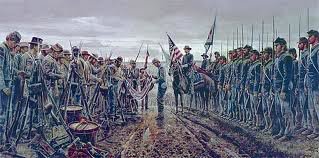 Image: Salute of Honor
Image: Salute of Honor
They faced each other in two long straight lines – just as they had so many times before on so many bloody fields of fire. This time was different. Three days earlier, General Robert E. Lee had surrendered the skeletal remnants of his hard-fighting Army of Northern Virginia to General Ulysses S. Grant in farmer Wilmer McLean’s parlor. Now it was time for the Sons of the South to lay down their arms and give up their bloodied battle flags. Now they again stood in great ranks opposite each other – one now the victor, the other now the vanquished.
~Mort Kunstler, Artist
In all, Chamberlain served in twenty battles and numerous skirmishes, and was wounded six times. After the Grand Review in Washington, DC, Fanny finally had her husband back home, along with an endless parade of visitors and dignitaries.
The years following the Civil War gave Fanny Chamberlain her fair share of difficulties, happiness and triumphs. Joshua’s inability to readjust to civilian life, and Fanny’s inability to understand what he had gone through, caused troubles in their marriage. Her husband worked hard to support his family, not always successfully, and both of them had suffered health problems.
Chamberlain served as Governor of Maine for four terms, from 1867 to 1871. There was no official governor’s residence, so Fanny continued to live in Brunswick, going to Augusta for special events. The separations due to war and politics put a strain on the marriage, and in 1868, Fanny considered filing for divorce. Joshua lived with neighbors for almost a year before the couple managed to patch up their relationship by 1870.
After leaving political office, Chamberlain returned to Bowdoin College. In 1871, he was appointed president of Bowdoin. That same year, the Chamberlain home (now the Joshua L. Chamberlain Museum) was vastly renovated to accommodate their influx of visitors. The house was lifted off the ground and an entire new first floor was constructed, designed by the Chamberlains themselves.
In 1883, when Chamberlain retired as president of Bowdoin, and for several years he and Fanny traveled frequently. He was involved in railroad and real estate ventures in Florida and New York. She joined him in both places before poor health intervened.
From the time of his serious wound in 1864 until his death, Joshua was forced to wear an early form of a catheter with a bag. Fanny accompanied him to Philadelphia where he underwent six operations on his pelvis to try to correct the original wound and stop the fevers and infections that plagued him, without success.
In 1893, thirty years after the battle that made the 20th Maine famous, Chamberlain was awarded the Medal of Honor for his actions at Gettysburg. The citation commends him for his “Daring heroism and great tenacity in holding his position on the Little Round Top against repeated assaults, and carrying the advance position on the Great Round Top.”
Beginning with his first election as governor of Maine and continuing to the end of his life, even as he suffered constant pain and discomfort from his wounds of 1864, Chamberlain was active in the Grand Army of the Republic and made many return visits to Gettysburg, giving speeches at soldiers’ reunions.
In May 1913, he made his last known visit to Gettysburg while involved in planning the 50th anniversary reunion. Due to deteriorating health, he was unable to attend the reunion two months later.
Fanny suffered eye problems her entire life and was often in pain, and it became clear after a number of years that she was going blind – a difficult time for a woman who so appreciated beauty and loved art. In her late sixties, she became blind in one eye and not long afterwards lost her sight completely. In her final years, her granddaughters described her as cold and melancholic, perhaps a symptom of losing her sight.
Joshua Chamberlain became a founding member of the Maine Institution for the Blind, in Portland, now called The Iris Network, and he served on the first Board of Directors for the Agency. In 1900, he was appointed Surveyor of the Port of Portland, Maine.
In the summer of 1905, Fanny fell at home and broke her hip. This soon caused an illness that forced her to bed, and by October, it was clear that she was not going to live much longer.
Fanny Chamberlain died at home in Brunswick on October 18, 1905, at the age of 80. Joshua was working in Portland, and did not arrive in time to say goodbye. She was buried three days later in Pine Grove Cemetery.
Joshua wrote a tribute to Fanny after her death:
You in my soul I see, faithful watcher, by my cot-side long days and nights together, through the delirium of mortal anguish – steadfast, calm, and sweet as eternal love. We pass now quickly from each other’s sight, but I know full well that where beyond these passing scenes you shall be, there will be heaven!
Joshua Lawrence Chamberlain died of his lingering wounds on February 24, 1914, at Portland, Maine, at the age of 85. He too is buried in Pine Grove Cemetery in Brunswick, Maine.
SOURCES
Fanny Chamberlain
Joshua Chamberlain
Defense of Little Round Top
Colonel Joshua Lawrence Chamberlain – Gettysburg
